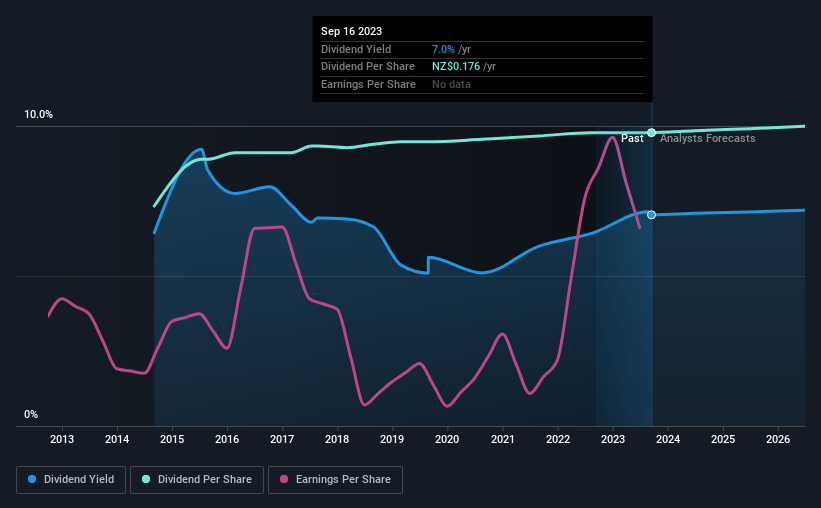Only Four Days Left To Cash In On Genesis Energy's (NZSE:GNE) Dividend
It looks like Genesis Energy Limited (NZSE:GNE) is about to go ex-dividend in the next four days. The ex-dividend date is usually set to be one business day before the record date which is the cut-off date on which you must be present on the company's books as a shareholder in order to receive the dividend. The ex-dividend date is important as the process of settlement involves two full business days. So if you miss that date, you would not show up on the company's books on the record date. In other words, investors can purchase Genesis Energy's shares before the 21st of September in order to be eligible for the dividend, which will be paid on the 6th of October.
The company's upcoming dividend is NZ$0.10 a share, following on from the last 12 months, when the company distributed a total of NZ$0.18 per share to shareholders. Looking at the last 12 months of distributions, Genesis Energy has a trailing yield of approximately 7.0% on its current stock price of NZ$2.5. Dividends are a major contributor to investment returns for long term holders, but only if the dividend continues to be paid. So we need to investigate whether Genesis Energy can afford its dividend, and if the dividend could grow.
Check out our latest analysis for Genesis Energy
Dividends are typically paid from company earnings. If a company pays more in dividends than it earned in profit, then the dividend could be unsustainable. Genesis Energy paid out 95% of its earnings, which is more than we're comfortable with, unless there are mitigating circumstances. Yet cash flows are even more important than profits for assessing a dividend, so we need to see if the company generated enough cash to pay its distribution. It distributed 43% of its free cash flow as dividends, a comfortable payout level for most companies.
It's good to see that while Genesis Energy's dividends were not well covered by profits, at least they are affordable from a cash perspective. Still, if the company continues paying out such a high percentage of its profits, the dividend could be at risk if business turns sour.
Click here to see the company's payout ratio, plus analyst estimates of its future dividends.
Have Earnings And Dividends Been Growing?
Stocks in companies that generate sustainable earnings growth often make the best dividend prospects, as it is easier to lift the dividend when earnings are rising. If earnings fall far enough, the company could be forced to cut its dividend. It's encouraging to see Genesis Energy has grown its earnings rapidly, up 56% a year for the past five years.
Another key way to measure a company's dividend prospects is by measuring its historical rate of dividend growth. In the last nine years, Genesis Energy has lifted its dividend by approximately 3.2% a year on average. It's good to see both earnings and the dividend have improved - although the former has been rising much quicker than the latter, possibly due to the company reinvesting more of its profits in growth.
To Sum It Up
Has Genesis Energy got what it takes to maintain its dividend payments? It's good to see earnings per share growing and low cashflow payout ratio, although we're uncomfortable with Genesis Energy's paying out such a high percentage of its profit. All things considered, we are not particularly enthused about Genesis Energy from a dividend perspective.
So while Genesis Energy looks good from a dividend perspective, it's always worthwhile being up to date with the risks involved in this stock. For example, we've found 3 warning signs for Genesis Energy (1 is a bit unpleasant!) that deserve your attention before investing in the shares.
Generally, we wouldn't recommend just buying the first dividend stock you see. Here's a curated list of interesting stocks that are strong dividend payers.
Have feedback on this article? Concerned about the content? Get in touch with us directly. Alternatively, email editorial-team (at) simplywallst.com.
This article by Simply Wall St is general in nature. We provide commentary based on historical data and analyst forecasts only using an unbiased methodology and our articles are not intended to be financial advice. It does not constitute a recommendation to buy or sell any stock, and does not take account of your objectives, or your financial situation. We aim to bring you long-term focused analysis driven by fundamental data. Note that our analysis may not factor in the latest price-sensitive company announcements or qualitative material. Simply Wall St has no position in any stocks mentioned.

